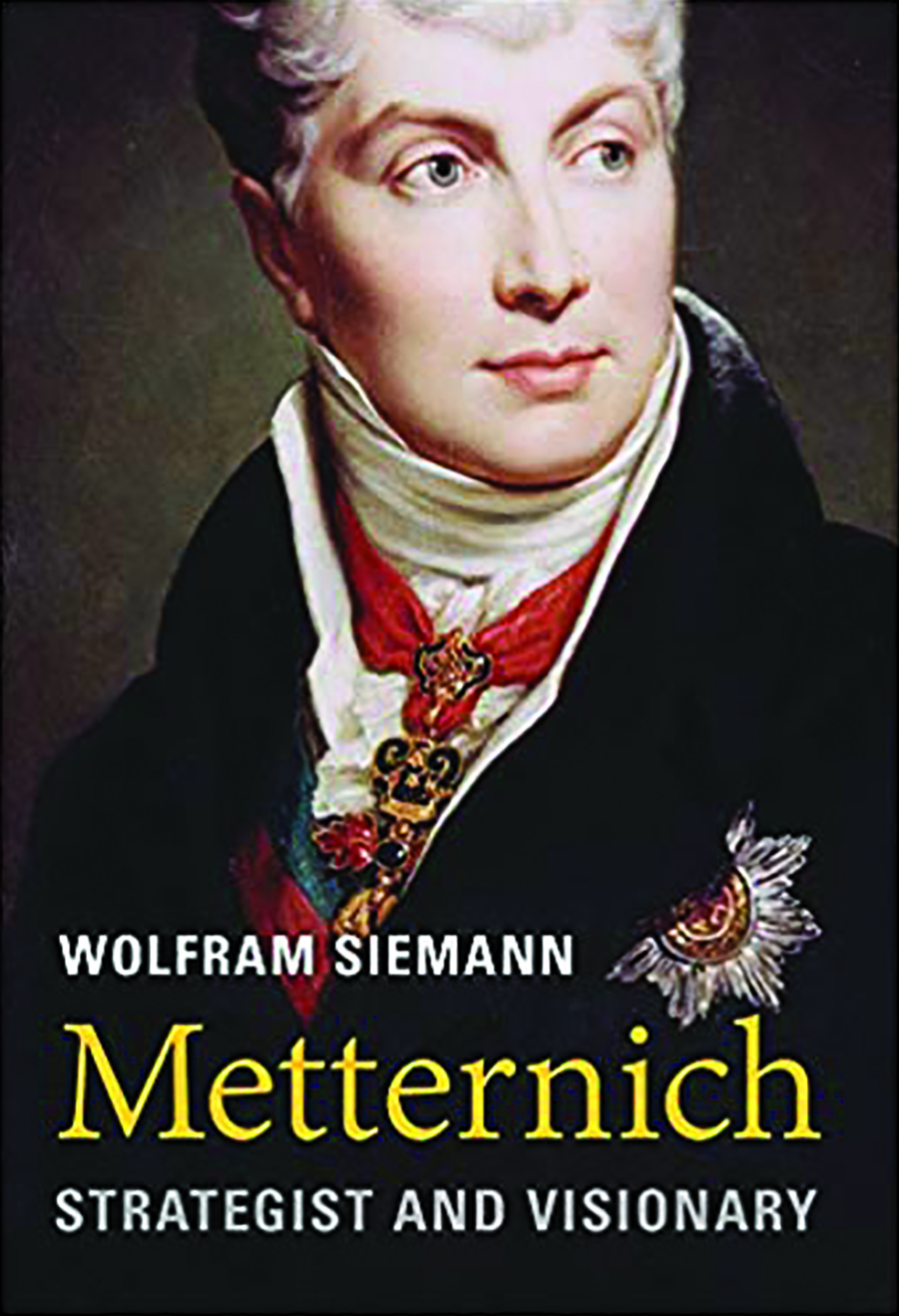The Habsburg Empire that dominated Central Europe from the Middle Ages until its collapse after World War I has long been seen as a byword for sclerosis and governmental ineptitude. Yet a recent wave of revisionist scholarship has begun to challenge this consensus. In 2018 alone, A. Weiss Mitchell’s The Grand Strategy of the Habsburg Empire sought to rehabilitate Vienna’s poor military reputation, while Pieter Judson’s The Habsburg Empire stressed the relatively innovative and progressive character of imperial government. The latest Habsburg reappraisal is Wolfram Siemann’s excellent biography of the Austrian diplomat Prince Klemens Von Metternich (1773-1859), often dismissed as the 19th century’s foremost footman for reactionary monarchism.
Siemann’s biography, published in German in 2016 and in English this November, is an exhaustive work of scholarship intended to set the historical record straight. Previous biographies of Metternich, even sympathetic ones, have generally relied on the work of authors hostile to his principles. Nationalists have regarded him as a “cunning, womanizing, effeminate, and cosmopolitan enemy of the German nation,” while other historians have criticized his hostility to democracy. Even those who acknowledge his diplomatic skill at the 1814-15 Congress of Vienna, where he helped negotiate an end to the Napoleonic Wars, often reduce that accomplishment to the establishment of an oppressive cabal. In fact, as Siemann shows, Metternich was skeptical about democracy, but not blindly so (he admired constitutional monarchy in the United Kingdom), and his resistance to nationalism was born of a fear of ethnic-based violence that subsequent centuries have more than vindicated.
Metternich was born in 1773 in Koblenz, in modern-day Germany, the eldest son of an aristocratic family. He entered government at age 19, after the outbreak of war between Austria and France in 1792, and rose rapidly within the diplomatic service, earning ambassadorial postings in Dresden and Berlin before being sent to Paris in 1806. His dealings with Napoleon from 1806 to 1815 were the essence of skillful diplomacy with a bad hand, made all the more striking for the unequaled amount of time he spent in personal contact with the French emperor. His short-term principles were flexible, but his long-term vision was clear: He knew that the defeat of Napoleon required a determined coalition, which was finally assembled in 1812-13, thanks in no small part to his efforts.

His success in staving off the revanchism of the victorious powers at the Congress of Vienna is one of Metternich’s few widely acknowledged accomplishments, but Siemann draws attention to other overlooked features of his diplomacy there. Napoleon had dramatically reorganized the geography of Germany with the creation of the Confederation of the Rhine in 1806, which dissolved the Holy Roman Empire. Metternich, as foreign minister of the last Holy Roman emperor, might have been expected to try to recreate every last bishopric. Instead, he accepted the fait accompli, observing that “the German Empire of a thousand years was dissolved … as much from the want of inward vitality as from external influences.”
Metternich’s reputation as a heartless reactionary is due in part to his various attempts to uphold the authority of central governments against ethnic and democratic movements, both in Austria and across Europe. Yet as Siemann shows, he was conscious of national identity; he simply found it an inadequate and indeed dangerous foundation for rule. Metternich recognized, according to Siemann, that “in Central Europe, any state that sought to define itself on the basis of linguistic homogeneity thereby created a problematic minority within its territory. And if these minorities, in turn, demanded their own nation-state, there would be war.” Siemann is also dismissive of the idea that Austria, following the Congress of Vienna, was significantly more reactionary or oppressive than the supposedly progressive states of Britain and France. Although Austria under Metternich was hostile to the rhetoric of liberalism and national liberation, it pursued and initiated no wars, nor did it engage in rapacious colonial conquests outside of Europe.
In fact, Metternich was something of a reformer himself. Siemann dedicates considerable attention to Metternich’s struggles to rationalize and improve the administration of the Habsburg Empire, which ran aground thanks to the ruling family’s and the nobility’s disinclination to yield any control over their personal fiefdoms. He reorganized the state chancellery on modern grounds and sought other reforms, including a comprehensive land survey to tax the nobility more effectively. His efforts, however, were foiled by the empire’s ossified bureaucracy and by his rival Franz Anton von Kolowrat-Liebsteinsky, the finance minister. Metternich was conscious of the need to accommodate diverse national and linguistic identities within the empire’s structure if his efforts to achieve meaningful reform were foiled. In an 1817 memorandum to Austrian Emperor Franz I, he cautioned that discontent with Habsburg rule could erupt in newly absorbed Lombardy and Venetia, “where the Italians daily see with sorrow German magistrates appointed to offices,” and counseled a greater respect for local linguistic sensitivities. He was mostly ignored. In the same year, he proposed a semi-federal reorganization of Austria that roughly accorded with several ethnic boundaries. This, too, went nowhere.
Metternich’s career ultimately ended in disgrace. After Franz I was replaced by his hapless son, Ferdinand I, in 1835, Metternich’s enemies at court gained the upper hand. He was sidelined, despite being the most capable man in the Austrian government, and blamed for the very stasis that he had repeatedly sought to overcome. Ever the diplomat, however, he refused to attack publicly the government that had been his lifelong employer. He resigned his post following the Austrian revolution of 1848, and after a brief exile in England and Belgium, returned to Vienna, where he spent his final years as an unofficial adviser to Emperor Franz Joseph I. History has credited him with crafting much of the European peace that lasted between 1815 and 1914; he deserves much more, and Siemann has given it to him.
Anthony Paletta is a writer living in Brooklyn.
